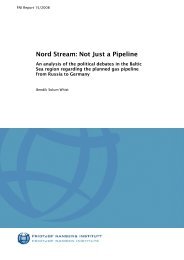SAIIA SOUTH AFRICAN DIPLOMATS ABROAD.pdf
SAIIA SOUTH AFRICAN DIPLOMATS ABROAD.pdf
SAIIA SOUTH AFRICAN DIPLOMATS ABROAD.pdf
Create successful ePaper yourself
Turn your PDF publications into a flip-book with our unique Google optimized e-Paper software.
A convention is not as clear an indication of self-administration<br />
as is a treaty, but it is a signpost of progress. It is worth<br />
while drawing attention to the preamble of yet another convention<br />
entered into by the Cape Colony, enjoying self-government<br />
but not dominion status, and the independent Republic of the<br />
Orange Free State. It was signed by Governor Sir Hercules<br />
Robinson and President F. W. Reitz respectively, on April 5, 1889.<br />
"His Excellency the Governor of the Cape of Good Hope<br />
and His Honour the President of the Orange Free State,<br />
on behalf of their respective governments .... have agreed<br />
upon the following articles. ..."<br />
On that occasion both sides were represented by the nominal<br />
heads of the countries concerned and not by diplomatic represen'<br />
tatives. There was already a precedent, however, for the con'<br />
elusion of treaties between self-governing colonies of the British<br />
Empire and foreign powers. This was the so-called "Fisheries<br />
Treaty" entered into by Canada (represented, it is true, by Britain)<br />
and the United_States, regulating the" fishing operations in neigh'<br />
bouring territorial and other waters. An international dispute<br />
had caused the mutual seizure of ships after which a settlement<br />
was arrived at and a treaty signed in Washington on February<br />
15, 1888. Contrary to all ideas then prevalent it was ratified<br />
by the Canadian Parliament on May 2nd. of same year, and<br />
received the Royal assent a fortnight later. (Unfortunately the<br />
United States Senate refused to approve it.)<br />
The precedent was carried further rive years later when<br />
Canada concluded a reciprocity treaty with France, although<br />
still using the machinery of the British Foreign Office. In 1896<br />
there was a further treaty with the United States to settle disputes<br />
about the Behring Straits.<br />
The importance of these developments were not lost on<br />
observant students of the constitutional development of the<br />
British Commonwealth.<br />
Quite apart from the Boer Republics the Cape entered the<br />
Held of diplomacy through another channel. Probably for the<br />
first time on record the British Government consulted a colony<br />
on a diplomatic question. It arose from the activities of Adolf<br />
Luderit: and other German subjects on the desolate coast of<br />
Damaraland, We are still suffering from the effects of the sequel<br />
to-day, eloquent evidence if any is needed, of the way the sins<br />
of the fathers (and grandfathers) are visited upon their descendants.<br />
The defeat of the South African proposal for the incorporation<br />
of South-West Africa put before the Assembly<br />
of the United Nations in 1946, was the aftermath of a correspondence<br />
between the Cape Government and Downing Street more<br />
than sixty years earlier. In 1880 the British authorities announced :<br />
(9)













